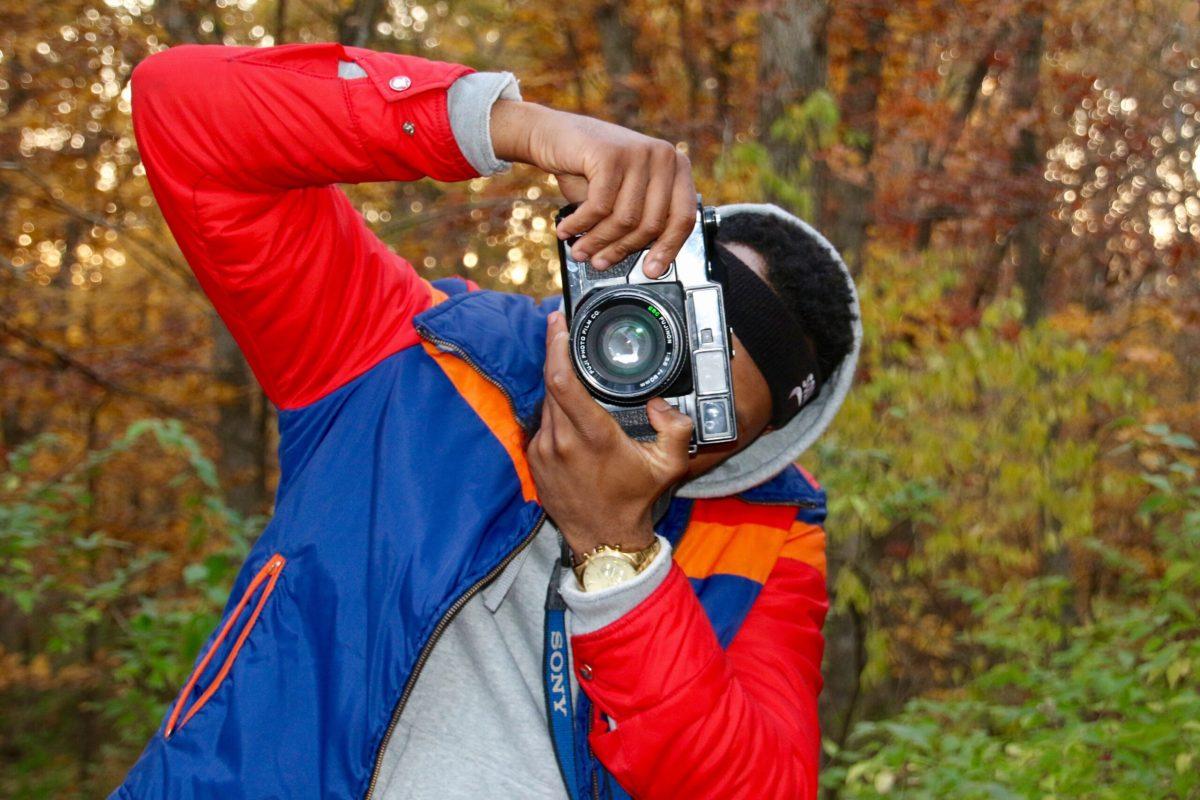
TJ Ronin is a visionary. Through photography, he challenges the norms of the world in which he lives. Ronin’s work will be displayed for the first time Nov. 29 at the Gaines/Oldham Black Culture Center. This includes his collection titled “Ex Tenebris Ad Lucëm,” which translates to “out of darkness into light.”
Before Ronin found his passion for photography, he grew up on the west side of Chicago, where being black was a role Ronin felt pressured to embody. For the past year, Ronin has been working on a project that focuses on the mental health of black individuals as a result of harmful socially constructed pressures and stereotypes.
“As a young black boy in those neighborhoods, I couldn’t do certain things,” Ronin said. “I love all different types of music, but you can’t play The Killers on the west side of Chicago. You have to fit into a stereotype. We can’t just be normal people. We can’t like anime. I pretty much like everything black men aren’t supposed to.”
Black men have historically been portrayed to exist on two sides of a spectrum in society with their identity either hyper-sexualized or criminalized, Ronin said. These restrictive stereotypes have been perpetuated through American society as far back as _The Birth of a Nation_, the film portraying the genesis of America’s identity, which blatantly conjures malignant and racist images of the African-American male.
Ronin felt these stereotypes defined and plagued his self-expression at a young age. Identity became the driving force of much of Ronin’s work. His photos picture models in active positions with dark and gritty lighting. In one photo, Nike Air shoes dangle around the neck of a shirtless man sitting on a stool bathed in black light, his form almost swallowed by it.
Depicting black people in diverse and all-encompassing ways inspires Ronin to create. He feels compelled to fight against the stereotypes that defined his identity growing up that continue today.
“Not in obvious ways, but in subtle ways I’m trying to critique how black identity is portrayed and how we utilize our portrayed identities as our own,” Ronin said. “We often accept those stereotypes as our own. I know I’m a black man, if I have my music loud I don’t care anymore. It’s not because I’m black, it’s because I like to have my music loud. That’s my identity.”
When Ronin started taking photos three years ago, he found the perfect weapon to combat adverse societal norms and work toward becoming the individual he is. Through this practice, the photographer aims to create things no one has before.
“I just want to know that when I die, I created shit no one else did,” Ronin said. “It’s so important for artists to question the status quo. My pictures are something no one else can do because it’s my eye. I’m trying so hard to be different. That’s my worst fear, making stuff like somebody else.”
In addition to combating racism, Ronin strives to emphasize the importance of individuality and creativity in his work. He has a passion to be the one creating the culture the public consumes and, in doing so, establish new socially accepted truths and norms.
“I feel like we live in a world where people are content with stuff being routine,” Ronin said. “People are cool with the order of go to college, get a job, etc. For me, I’ve always wanted more than that. I don’t want to be an observer; I want to participate in the culture and create things that are going to change the world.”
This goal comes from an ambitious inner confidence Ronin possesses. This assuredness gives him a refreshing perspective on what it means to be great. Ronin’s favorite artist is Kanye West; he feels they share a similar mentality.
“I admire his mindset,” Ronin said. “He believes so much in himself, and that’s a trait a lot of people don’t have. As I took photography more seriously and wanted to be really good at it, I started to realize you have to set yourself apart. I’m a very critical person, especially of myself, but I also know what I can do.”
Ronin has a vision for his work. The models’ body language, lighting on set and color scheme are all manipulated to serve the photo he wants to capture. Fashion influences and inspires Ronin’s style, which contributes to his meticulous attention to detail.
“Photographers depict the truth, but it’s a perceived truth,” Ronin said. “I pose my models because it’s my vision, so why not put your hand all the way in it? If you’re not directing what’s going on, you’re just surveying something not yours.”
_Edited by Claire Colby | [email protected]_